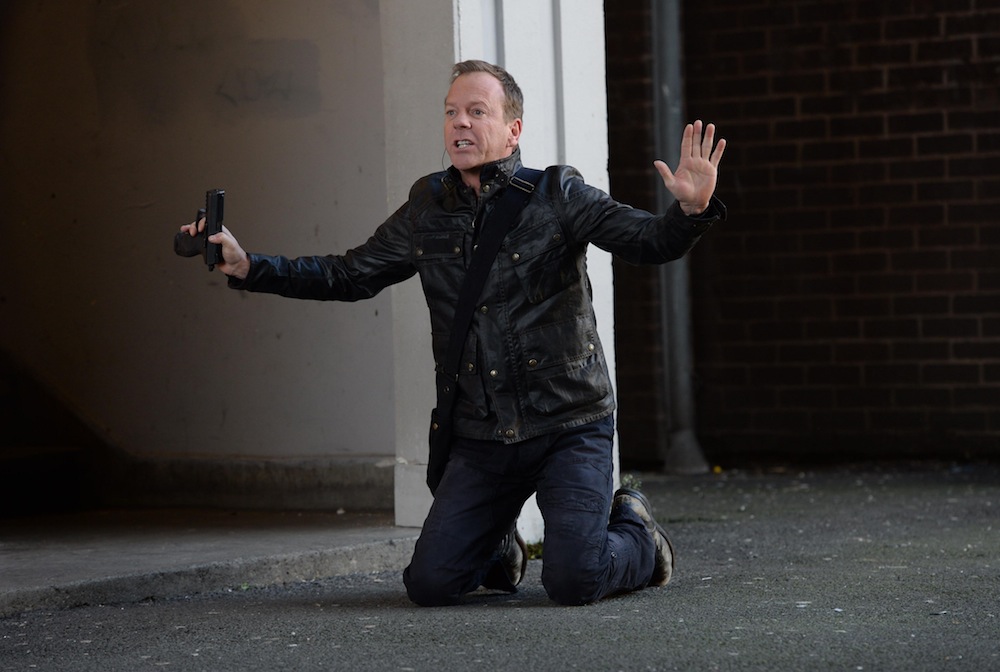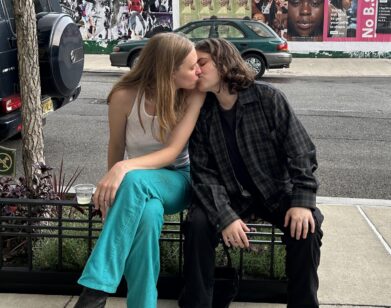The 24th Hour

ABOVE: KIEFER SUTHERLAND IN 24: LIVE ANOTHER DAY. PHOTO COURTESY OF FOX.
Four years ago, Manny Coto and Evan Katz stopped dreaming up new missions for Jack Bauer, the dogged counter-terrorist agent played by Kiefer Sutherland on Fox’s serial thriller, 24. As writers and executive producers for 24, Coto and Katz were happy with how season eight of the show brought Bauer’s story to a close in 2010, with him in exile and wanted by U.S. and Russian authorities. When talks ensued about a possible 24 feature film, Coto and Katz were not involved. Coto had joined Showtime’s Dexter as a writer and executive producer; Katz had signed on as showrunner for NBC’s The Event and then ABC’s Body of Proof.
In January, the creative team behind 24 reunited to begin production on the 12-episode event series, 24: Live Another Day, which catches up with Bauer, still a fugitive, four years after the events of season eight. As he entangles himself in international conflicts reflecting current political topics of debate, such as drone missiles and free information, he finds a new ally in CIA operative Kate Morgan (Yvonne Strahovski) and reconnects with his old love, Audrey Boudreau (Kim Raver), last seen catatonic in season six.
Set in London, the new series stays true to the 24 model, spreading a single day’s worth of high-stakes action across one season. However, working with only 12 episodes this time, showrunners Coto and Katz had to compromise the show’s traditional concept of depicting 24 continuous hours in real time. The quandary had yet to be resolved well into shooting, but the title of the final episode, “Day 9: 10:00 p.m-11:00 a.m.,” airing on July 14, suggests one or more time jumps.
CHRIS TINKHAM: What have been the challenges of transitioning to a 12-episode format?
EVAN KATZ: The show is just as challenging whether you’re doing 12 or 24; there’s just more of them with 24. We wanted to make sure early on that we had a way to cover a 24-hour day with a time jump—one or more—and we suspected early on and realized soon into the process that we didn’t want to overuse the time jump device. But what’s most challenging about the show is that we’ve done over 200 episodes at this point, and surprising the viewer—and surprising us as we work on it—gets progressively more difficult.
TINKHAM: Were there news stories that occurred during the four-year interval, such as Osama bin Laden’s capture, which affected this story?
MANNY COTO: The idea of Jack Bauer as, if not a terrorist, then an international criminal or wanted man, was somewhat influenced by bin Laden’s capture. Meaning, if Jack were captured like bin Laden or looked at the same way as bin Laden, we thought there’s a wonderful irony there, for our character, who’s spent so much of his life fighting terrorism, to now be considered a terrorist. To open the season with a bin Laden-like capture felt like an interesting way to start series nine.
TINKHAM: How did the setting of London come about?
KATZ: A couple of different ways. We flirted with doing a storyline in London over the years, and we had these grand plans. We would pre-write all of it, and it just never worked. So it was combined with a pre-existing desire to do it as well as a desire to something automatically different, to make this more of an event. It also synched-up perfectly with the idea that Jack had been sent into exile at the end of season eight. It was more likely that he’d be out of the country than not.
TINKHAM: Had you contemplated bringing back Kim Raver’s character for any of the seasons prior to this one?
KATZ: No. We had left her character pretty scorched in terms of her mental state, and to bring her back one or two years after she was a basket case, I think would have rang false. We were even concerned, for a time, that four years wouldn’t have been enough time for her to recover.
TINKHAM: Who’s responsible for keeping up with advancements in technology and jargon?
COTO: We pretty much stay abreast of what’s going on technology-wise, which is why this year we brought in the drones plot and the WikiLeaks analogue.
TINKHAM: How does your collaborative process work, specifically the writing?
KATZ: We each have our own office, but we have a conference room. We’ll spend 95 percent of our day sitting in the conference room, essentially making it our own office, breaking story, working things out, meeting with other writers, and when we actually write, we’ll go off into our respective corners and we’ll each take a few acts, give each other notes, and then again and again until we get it to where we want it to be.
TINKHAM: Did working on other shows like Dexter and Body of Proof in the interim have any affect on your approach to this season of 24?
COTO: I can’t really say that it did. For me, 24 was its own special animal. What I’d done on Dexter didn’t really play into it at all. It was more just having to switch mindsets from Dexter, which is more of a wry, almost a black comedy, to 24, which is very straightforward and plot-oriented and relentless.
KATZ: I think that’s right. Manny and I having four years of different experiences probably informs things, but I will say, for both of us, it felt awfully good to come back, to get back in that driver’s seat and start telling stories in this style.
TINKHAM: Was Yvonne Strahovski’s work on Dexter instrumental to her getting the part of Kate Morgan?
COTO: Certainly. I really loved her on Dexter and enjoyed working with her, and when we conceived of this character, one of the names that came to my mind almost immediately was Yvonne. She was one of the first people we met, and Evan and Howard [Gordon, co-showrunner], they liked her as well. We ended up looking at a lot of people just because we didn’t trust our first instincts, but ultimately came back to Yvonne. We couldn’t have been happier.
KATZ: I think she literally was the first person.
COTO: She was the first one, that’s right.
KATZ: Manny had that notion very early on.
TINKHAM: Has Kiefer Sutherland’s involvement behind the camera changed much for this season?
COTO: Not particularly. Kiefer has very sharp, creative instincts, especially when it comes to his character. He’s internalized the character for so long, and he’s really inside the skin of Jack Bauer. He helps us keep true to the character and stay focused on what the character would be thinking and doing.
TINKHAM: As each season passes, is it more difficult to keep finale details secret? Do you have to use new tricks?
KATZ: Yes. It used to be that all you had to do was print the script on red paper. But I guess red paper’s easier to Xerox than it used to be, and the truth of the matter is, people don’t really do most of their reading at this point on paper. So it’s electronic distribution with watermarked copies, and for the last two episodes, we instituted a much smaller distribution list. We had talked at some point about having the crew sign non-disclosure agreements, but I don’t know that that actually happened. But yeah, the episodes entered an electronic choke point.
COTO: So what we ended up doing was not even writing episode 12 and having them improvise it on set. [laughs] That’s the only way we figure we can keep it secret.
TINKHAM: Back in May, Yvonne said in an interview that the show would be skipping hours and minutes between episodes. Was that a red herring?
KATZ: No. [laughs] We may have, at that point, been figuring it out. We still weren’t completely sure how we were going to do this, but ultimately we came upon an approach that we like, that didn’t involve skipping between episodes.
TINKHAM: Is there anything you’d like to say or confirm about the time jump that will occur?
KATZ: We don’t want to give away when we do it or why we do it, ’cause it’s done for emotional reasons as much as it’s done for logistical reasons, which is a statement that will make sense when you see it. We hope.
TINKHAM: How satisfied were you with the end of season eight, thinking that had been the last one?
COTO: We actually were very satisfied with it. We were prepared to move on. That was it, as far as we were concerned. We were living very happy lives.
KATZ: But now that we’ve actually done it again, I think both of us feel really happy we did, and very satisfied.
TINKHAM: How does this conclusion feel compared to the last time you ended the show?
COTO: Honestly, we feel that this season has gotten more response than the last three seasons we did. It’s been one steady course of happy fans. So, we’re really thrilled, which is not really what we experienced in the last few seasons. I’m really happy with all the work we did in those seasons, but this one really seems to have struck a chord. People seem to love it, one episode after another, so it’s been exciting.
KATZ: I think part of it is that absence makes the heart grow fonder, and part of it is that Manny and I consciously made an attempt to return the show to its thriller roots, in a focused way. Part of what helped that was, with only 12 episodes, I think we felt an unconscious drive to make sure we got the greatest hits in.
THE SEASON FINALE OF 24: LIVE ANOTHER DAY, AIRS TONIGHT, JANUARY 14, ON FOX.






